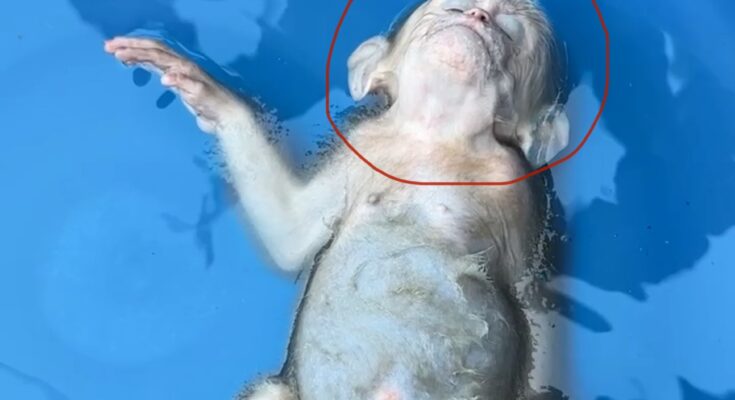In recent years, animal researchers and wildlife veterinarians have explored various therapeutic techniques to improve the well-being of animals in captivity and rehabilitation settings. One such method under observation is the use of warm water baths in primates, particularly young ones, to reduce stress and promote better blood circulation.
While the concept may sound surprising, there is growing anecdotal and observational evidence, especially from primate rescue centers and sanctuaries, that warm water immersion can provide comfort to certain species of monkeys — not as a treatment, but as an enrichment tool under professional supervision.
Natural Behavior and Affinity for Water
Some species of monkeys, such as the Japanese macaque (also known as the snow monkey), are naturally inclined to soak in hot springs during colder months. These behaviors have been linked to both thermoregulation and stress reduction. In a study published in Primates (Springer, 2018), scientists found that macaques who spent more time in hot springs had lower levels of glucocorticoids, a hormone associated with stress.
This behavior has inspired researchers to consider whether similar methods can be used in controlled environments to support primates that are injured, orphaned, or undergoing medical rehabilitation.
The Role of Warm Water in Stress Reduction
Warm water immersion — when done safely and in a controlled environment — can activate the parasympathetic nervous system, which is responsible for the body’s rest and relaxation responses. This effect is well-documented in humans and is now being explored cautiously in animals.
In rescued baby primates, especially those recovering from trauma or illness, gentle exposure to warm water under veterinary supervision has shown promising signs of promoting calm behavior, improving appetite, and enhancing social bonding with caregivers.
It’s important to note that this is not a common or routine practice for all monkeys and must never be applied without expert oversight. Monkeys, especially babies, are extremely sensitive and can suffer from shock, hypothermia, or stress if handled improperly.
Improved Circulation and Muscle Relaxation
Warm water helps increase blood flow by dilating blood vessels. For monkeys recovering from injuries or suffering from cold stress, this can help with circulation and muscle relaxation. In some rehabilitation centers, hydrotherapy has been used for older or injured primates with arthritis or joint issues.
Again, it must be emphasized that such therapies are used sparingly and only when recommended by licensed veterinarians or animal physiotherapists.
Ethical Considerations
Any form of treatment involving animals must prioritize their welfare, consent (in terms of behavioral willingness), and comfort. What may seem relaxing to a human might be distressing to a baby monkey. Therefore, behavioral cues and proper monitoring are essential.
Conclusion
While the idea of a baby monkey soaking in warm water may sound peculiar, there is growing scientific curiosity around the use of controlled hydrotherapy for stress relief and improved circulation in some primate species. However, this should never be misunderstood as a casual or recreational activity. Animal care is a serious responsibility, and all interventions must be grounded in ethical practices and scientific evidence.



